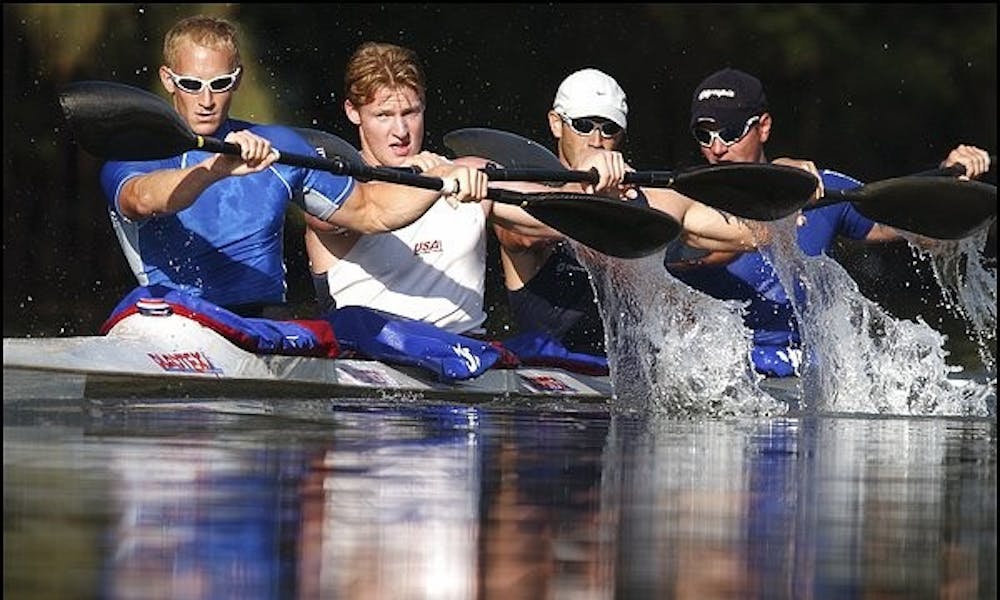
Seated in his pale blue scrubs with a Wharton cap covering his dirty blond hair, Benjamin Lewis looks low-key at first glance.
But the seventh year School of Veterinary Medicine and Wharton dual-degree student and former United States Olympic kayak team captain may have the potential to save thousands of human and animal lives with his startup Ethical Animal Research, he said.
He gave the example of testing a diabetes drug to explain the purpose of his company. Right now, a big pharmaceutical company will induce diabetes in healthy animals to test the drug before advancing to human trials. Instead, Ethical Animal Research will crowd-source already sick animals to provide drug companies with a population of animals to test their drugs on.
The existing process has three steps. First, “you’re inducing horrific diseases [in the animals], then you test [the drug] on the animal” and finally “you kill it,” he said. “So it’s a pretty shitty value chain for the animal.”
Lewis said the animal testing industry kills about 100 million animals a year, but has not seen much innovation over the past century. He thinks this boils down to the nature of the industry — no one really wants to talk about killing animals for a living.
By changing the prevailing model for second round preclinical trials — when the effectiveness of drugs are tested in animals — Lewis believes he can help pet owners, doctors and drug companies. And with over 50 clinical trials conducted by members of his network — scientists who “wrote the book” for their specific industries — he’s got the data to back it up, he said.
First, he said, testing on already sick animals is more accurate for pharmaceutical companies. “Induced disease is a terrible proxy for natural disease,” he said, “whereas natural disease is a wonderful proxy for natural disease.” Lewis added that with the current model, 92 percent of studies in animals fail in humans. If pharmaceutical companies can fail their drugs earlier, at the animal testing stage, they can save hundreds of millions of dollars spent developing drugs that will eventually not get federal Food and Drug Administration approval.
“Targeting naturally occurred conditions instead of artificially created models is going to be much more predictive of the clinical outcome, beside saving thousands of animal lives and being a much more conscious way to conduct research,” Children’s Hospital of Philadelphia postdoctoral student Federica Sgariglia wrote in an email.
Currently, Ethical Animal Research has about 100,000 animals in its recruitment base, Lewis said. Soon, it hopes to add 600,000 and eventually, grow into the millions.
“We have some projects in the pipeline; the momentum is pretty strong,” said Nikhil Joshi, a fourth year veterinary student, former Accenture consultant and member of the Ethical Animal Research team. “We’re accelerating toward being a live, profit-generating company.”
Lewis said sick animals and their owners are better off because Ethical Animal Research will pay for the treatments to be administered to animals, who are often left to die because the cost of medical procedures can be prohibitive for animal owners. Veterinarians benefit too because they get paid to conduct procedures where the owners might have otherwise walked away due to cost.
This is not the first time an organization has tried to recruit sick animals for studies. Lewis said the FDA launched a similar program but that it failed because vets were not paid for the treatments. Ethical Animal Research, by contrast, will incentivize vets by paying them for the treatments.
The market size of the animal testing industry is 20 billion dollars, Lewis said. Meanwhile, demand for his service is “completely inelastic” because pharmaceutical companies are required by the FDA to conduct animal research.
Lewis’s wife and business partner Christina Lopes, who is a World Economic Forum Young Global Leader, said his combination of passion and pragmatism puts him in a “sweet spot” to advance the industry.
“His heart is really in the business. He really is an animal lover,” she said.
This is not Lewis's first entrepreneurial endeavor, nor does he believe it will be his last. Until this past December, Lewis worked in Brazil at 4Vets, a company he started after dropping out of Penn two years ago. The company distributes animal products in Brazil.
He said that he recognized the business opportunity while on spring break in Brazil. “The entire supply chain of the country was backwards,” he said. He remembered thinking, “There’s a huge opportunity here. It turned out to be the second largest pet market in the world.” The company, he said, is now worth more than 20 million dollars.
Lewis hails from southern Florida. He spoke highly of his father, a doctor, who repeatedly dabbled and failed in business, and taught him what not to do in business.
Lewis grew up training to be an Olympic kayaker. He said he trained summers for the event and eventually dropped out of Dartmouth after freshman year to train full time. He eventually reached the semifinals at the Athens Olympics in 2004, where he was the captain of the U.S. Olympic kayaking team.
Lopes said competing in the Olympics was important leadership training for her husband. “I think how he runs teams is that people feel excited by his ideas. They feel that he trusts them,” she said.
In December 2014, Lewis left Brazil for Penn, where he is now studying full time. He hopes to graduate after fall semester of next year. He is not sure, however, whether he will make it that far. It might be time to drop out again.
The Daily Pennsylvanian is an independent, student-run newspaper. Please consider making a donation to support the coverage that shapes the University. Your generosity ensures a future of strong journalism at Penn.
DonatePlease note All comments are eligible for publication in The Daily Pennsylvanian.







